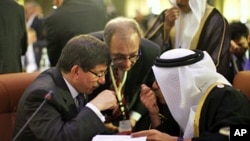A joint European Union-Turkish parliamentary committee is meeting to look at the EU's growing concern over human rights and Turkey's stalled EU bid. But, Turkey's growing regional importance is now a major factor in the talks.
The joint committee brings together Turkish and European parliamentarians to help in Ankara's bid to join the European Union. Human rights and judicial reform dominated two days of talks in Istanbul. Sajjid Karim, a European parliamentary deputy on the committee, expressed alarm at what he says is a deteriorating human rights and freedom of the press situation and Turkish government indifference.
"I am left unconvinced that at a governmental that due and proper consideration is being given for the numbers of people who are actually detained, for their journalistic activities," said Karim. " We were provided with a figure of 107. I was also surprised to hear that the way that the definition of terror crimes is working, currently there are approximately 12,000 people who [are] in detention as a result of that."
Most of the detentions have been part of the Turkish state's battle against the Kurdish rebel group, the PKK. Brussels, along with human rights groups, have criticized the nature of the Turkish anti-terror laws which have resulted in imprisonment of many people not involved in violence.
But the Turkish minister of justice, Sadullah Ergin, who attended Friday's meeting, claimed only a dozen people are in jail for journalism activities and that only 1,000 or so are detained under the anti-terror law. Ergin, however, acknowledged reform is needed and said he is committed to introduce change.
He says they have introduced many reforms to address problems within the judiciary and are committed to do more in consultation with the EU and other bodies. He said no one should doubt Turkey's commitment to reform.
But Turkish opposition members of parliament attending the meeting say that with every reform introduced by the government since 2005, the numbers of arrests and detentions of both journalists and political activists have increased. The claim has been supported by international human rights groups like Reporters Without Borders.
The head of the joint parliamentary group, Helene Flaurtre, welcomed Turkish reforms and said international considerations have to be taken into account.
Flaurtre says yes, the EU is very vigilant on human rights but she does not want to take a negative view of Turkey. She says there is now a successful engagement with the Turkish government and that when one looks at the situation in Syria and the wider Arab world, it would be disastrous if relations broke down between Turkey and the EU.
Ankara has been at the forefront of condemning Damascus's crackdown on dissent and is working closely with both Brussels and Washington in coordinating efforts in support of the Syrian opposition.
But a member of the joint parliamentary committee, who is the spokesman for Turkish affairs for the socialist bloc of the European Parliament, worries that criticism of Ankara is being muted both in Europe and the United States. Richard Howitt cites Turkey's growing role in opposing the Syrian government.
"I think there it is a fair question to say is there a danger of a trade off," said Howitt. "That we are not asking harder questions as we should be. That a blind eye is being turned towards some of the escalation of problems in relation to the failure of the judiciary, the arbitrary [nature)]of the arrests, the lack of freedom of expression within the country. And that of course can never be justified. And as far as Europe is concerned, there are those who won't justify that."
International human rights groups, like U.S.-based Human Rights Watch, have raised similar concerns. But with Damascus intensifying its crackdown on dissent, and Turkey, which is increasingly being seen as playing a potentially crucial role in supporting the opposition, observers say there is likely to be little incentive either in Brussels or Washington to challenge Ankara on its domestic policy.
Press Freedom Concerns in Turkey Worry EU Negotiators
- By Dorian Jones




